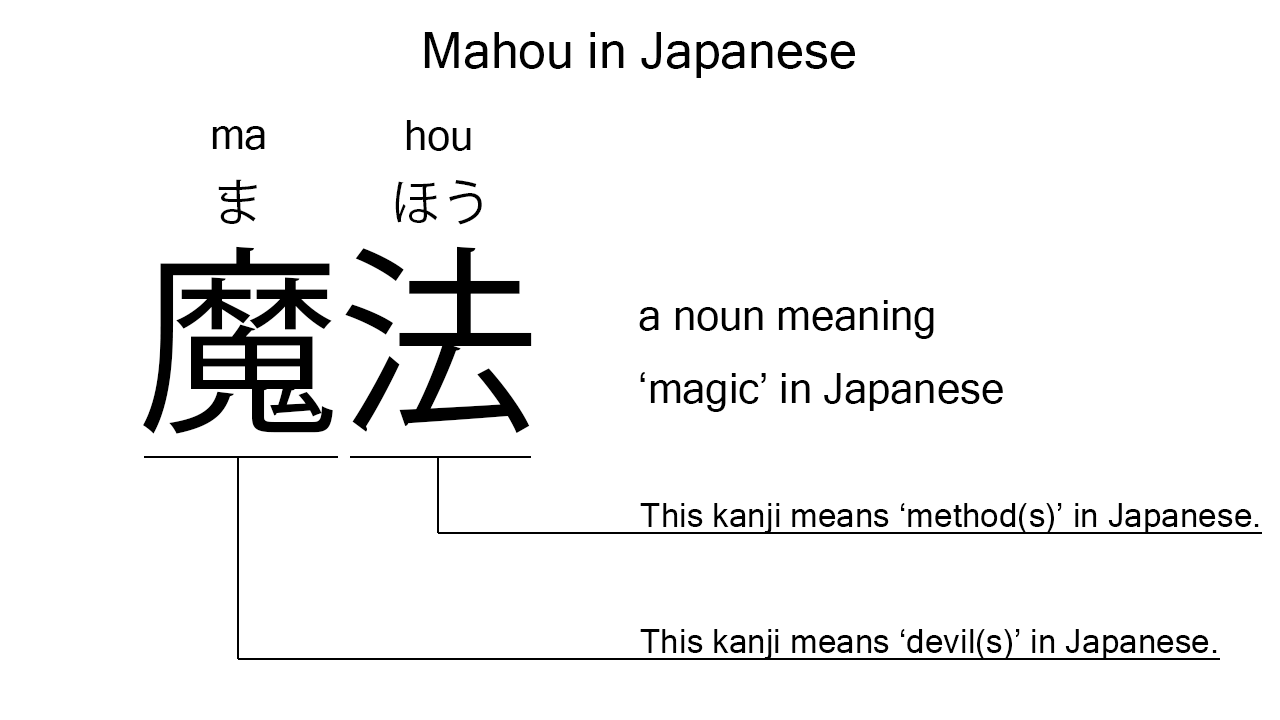What does “mahou” mean in Japanese?
“Mahou” is not commonly used in Japanese conversations. Interestingly, however, many Japanese learners know this word as it is very often used in Japanese movies, songs, manga, anime, and the like.
Native speakers say “mahou” normally to mean ‘magic’ in Japanese. In this blog post, I will explain its definition and meanings in detail based on its kanji expression. And also, I will explain how to use it through example sentences. My explanations would help Japanese learners understand “mahou” more clearly. Then, let’s get started!
Contents
Definition and meanings of “mahou”
Let me start with the definition and meanings of “mahou”.
- mahou – 魔法 (まほう) : a noun meaning ‘magic’ in Japanese. Depending on the context and situation, this can also mean ‘sorcery’, ‘magic power’, or such in Japanese.
Native speakers use this noun normally to mean ‘magic’ in Japanese. In addition, they sometimes use this as a metaphor for an unbelievable method or result. So, we need to be a bit careful with the context and situation.
The definition and meanings are not that difficult, I think. To understand this noun more clearly, however, let me explain its kanji characters in detail, one by one.
What does “mahou” literally mean in Japanese?
The kanji expression of “mahou” consists of the following two kanji characters:
- 魔 : a kanji character used to mean ‘devil’, ‘demon’, or ‘something supernatural’ in Japanese.
- 法 : a kanji character used to mean ‘method’, ‘process’, ‘law’, or such in Japanese.
These two kanji characters tell us that “mahou” literally means a ‘devil method’ in Japanese. This literal interpretation is not completely in line with the actual meanings, but still understandable, I think. Magic is often a collection of methods which devils are likely to take to do something.

When we meet new kanji expressions, we should check their kanji characters in detail to understand their meanings clearly and deeply. In many cases, kanji characters tell us a lot about the meanings of the expressions they form. Actually, here, we could get the better understanding of “mahou” through the detailed kanji check above.
So far, I’ve explained the definition and meanings of “mahou” together with its kanji characters. Then, let me explain how to use it through the example sentences below.
Example #1: how to say “magic” in Japanese
watashi no musume wa tokidoki mahou wo tsukau – 私の娘は時々魔法を使う (わたしのむすめはときどきまほうをつかう)
My daughter sometimes uses magic.
Below are the new words used in the example sentence.
- watashi – 私 (わたし) : a pronoun meaning ‘I’ in Japanese.
- no – の : a case particle used after a noun or pronoun to make its possessive case. In the example, this is used after “watashi” to make its possessive case, “watashi no“, which means ‘my’ in Japanese.
- musume – 娘 (むすめ) : a noun meaning ‘daughter’ in Japanese. This can also work as plural. Learn more about Japanese plural.
- wa – は : a binding particle working as a case marker or topic marker. In the example, this works after “watashi no musume” to make the subject in the sentence.
- tokidoki – 時々 (ときどき) : an adverb of frequency meaning ‘sometimes’ in Japanese.
- wo – を : a case particle used to make the object word in a sentence. In the example, this is used after “mahou” to make the object in the sentence.
- tsukau – 使う (つかう) : a verb meaning ‘to use’ in Japanese.
This is a typical usage of “mahou”. In this example, it works as the object in the sentence and means ‘magic’ in Japanese. When we want to say “magic” in Japanese, anyway, this noun is a very good option.
“To cast spells” can be more natural than “to use magic” as the translation for “mahou wo tsukau”, but I tried to keep the original meaning of the Japanese sentence.
Example #2: another usage of “mahou”
kanojo no shigoto wa marude mahou desu – 彼女の仕事はまるで魔法です (かのじょのしごとはまるでまほうです)
Her work is like magic.
Below are the new words used in the example sentence.
- kanojo – 彼女 (かのじょ) : a pronoun meaning ‘she’ in Japanese. In the example, this works together with the case particle, “no”, to say “her” in Japanese.
- shigoto – 仕事 (しごと) : a noun meaning ‘work’ in Japanese.
- marude – まるで : an adverb meaning ‘like’, ‘as if’, or such in Japanese. In the example, this works before “mahou” to add the meaning of ‘like’.
- desu – です : an auxiliary verb used after a noun or adjective to make it polite. Probably, this is well known as a part of Japanese desu form. In the example, this is used after “mahou” to make it sound polite.
This is another typical usage of “mahou”. In this example, it works as a metaphor for her magic-like work. This usage as well is very similar to that of “magic” in English, so those who are familiar with English can easily understand how to use this Japanese noun, I think.
Summary
In this blog post, I’ve explained the definition and meanings of “mahou” in detail based on its kanji expression. And also, I’ve explained how to use it through the example sentences. Let me summarize them as follows.
- mahou – 魔法 (まほう) : a noun meaning ‘magic’ in Japanese. Depending on the context and situation, this can also mean ‘sorcery’, ‘magic power’, or such in Japanese. This can also work as a metaphor for an unbelievable method or result. These two kanji characters literally mean a ‘devil method’ in Japanese. This literal interpretation is not completely in line with the actual meanings, but still understandable, I think. Magic is often a collection of methods which devils are likely to take to do something.
Hope my explanations are understandable and helpful for Japanese learners.